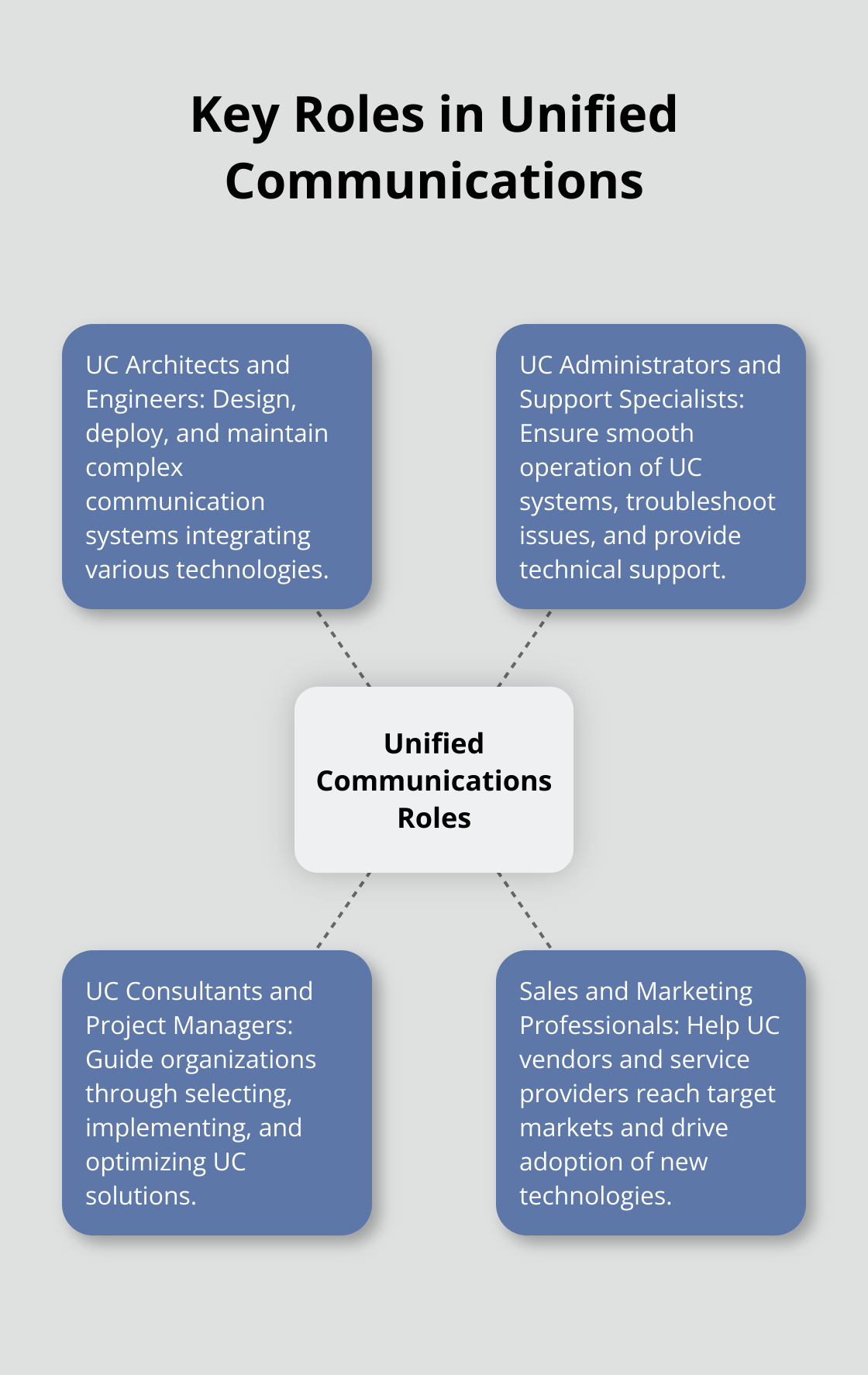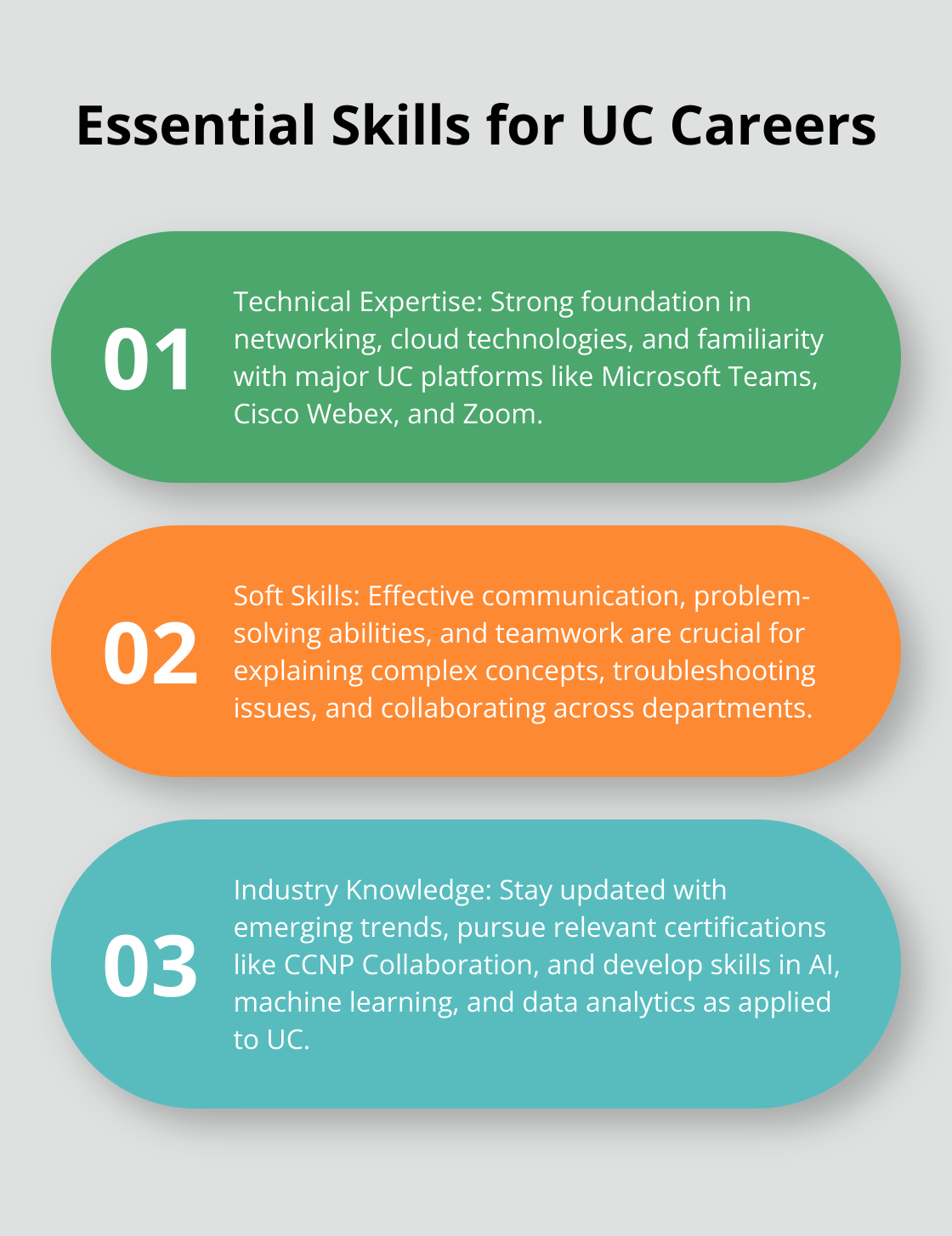Unified communications (UC) careers are on the rise, offering exciting opportunities for professionals across tech, consulting, and support roles.
At UCaaS Review, we’ve seen how the rapid evolution of UC has created strong demand for skilled talent in nearly every sector. In this post, we’ll walk through the most in-demand roles, the skills that matter, and how to build a successful path in this growing field.
Understanding Unified Communications
What is Unified Communications?
Unified Communications (UC) is a transformative technology that revolutionizes business communication and collaboration. UC integrates multiple communication tools (voice calls, video conferencing, instant messaging, email, and file sharing) into a single, cohesive platform. The global unified communications market is expected to grow at a compound annual growth rate of 17.4% from 2023 to 2030 to reach USD 417.86 billion by 2030.

The Evolution of UC Technology
UC has transformed significantly since its inception. Initially, businesses used separate systems for different communication needs, leading to inefficiencies and miscommunication. Modern UC platforms offer seamless integration, allowing employees to switch between communication methods effortlessly.
Cloud-based solutions represent a major advancement in UC technology. This growth stems largely from the increased adoption of cloud-based UC solutions, which offer enhanced flexibility and scalability.
The Impact of UC on Modern Businesses
UC plays a vital role. The rise of remote and hybrid work models has made effective communication tools essential. Unified communications benefits include improved productivity, optimized workflows, reduced costs, increased ROI, and IT efficiency.
UC platforms drive tangible business results. Companies using UC report improved customer support and healthcare appointment attendance rates through improved communication.
Implementing UC Successfully
Successful UC implementation requires careful planning. Here are some practical tips:
- Prioritize user experience: The UC platform should be intuitive and easy to use for all employees.
- Provide comprehensive training: Offer ongoing training sessions to help staff maximize the new tools.
- Implement a phased rollout: For larger organizations, gradual implementation can help resolve issues before full deployment.
The Future of UC
As we look ahead, UC continues to evolve. Artificial Intelligence (AI) and Machine Learning (ML) are becoming integral parts of UC platforms. The top practical applications of UC AI include enhanced collaboration tools, improved customer experience, and more.
The integration of UC with other business systems (such as CRM and ERP) is also on the rise, creating more streamlined workflows and improved data accessibility.
These advancements in UC technology open up new career opportunities in the field. From UC architects designing these integrated systems to AI specialists developing new UC features, the future of UC careers looks bright and diverse. In the next section, we’ll explore the key roles that make up the exciting world of Unified Communications.
Key Roles in Unified Communications
The Unified Communications (UC) industry offers a diverse range of career opportunities for professionals with varying skill sets. The demand for UC experts across different sectors continues to grow. Let’s explore some of the key roles that shape the future of business communication.

UC Architects and Engineers
UC Architects and Engineers support the organization’s LAN/WAN/MAN, including planning, installation, maintenance, monitoring, and replacement/upgrade of network systems. These professionals design, deploy, and maintain complex communication systems that integrate various technologies. They need a deep understanding of networking protocols, VoIP systems, and cloud technologies.
To excel in this role, professionals should consider obtaining certifications such as Cisco Certified Network Professional (CCNP) Collaboration or Microsoft Teams Voice Engineer. These certifications can significantly boost earning potential and job prospects.
UC Administrators and Support Specialists
UC Administrators and Support Specialists ensure the smooth operation of UC systems on a day-to-day basis. They troubleshoot issues, manage user accounts, and provide technical support to end-users.
For those interested in this career path, developing strong problem-solving skills and staying updated with the latest UC technologies is important. Many companies offer internal training programs, but self-study resources like online courses on UC administration can also prove valuable.
UC Consultants and Project Managers
UC Consultants and Project Managers guide organizations through the complex process of selecting, implementing, and optimizing UC solutions. They bridge the gap between technical teams and business stakeholders, ensuring that UC initiatives align with organizational goals.
Employment in media and communication occupations is projected to grow about as fast as the average for all occupations from 2023 to 2033. Successful professionals in this field often combine technical knowledge with strong communication and leadership skills.
To stand out in this role, try pursuing a Project Management Professional (PMP) certification alongside UC-specific qualifications. This combination can lead to lucrative opportunities in the field.
Sales and Marketing Professionals in UC
While technical roles are important, the UC industry also relies heavily on skilled sales and marketing professionals. These experts help UC vendors and service providers reach their target markets and drive adoption of new technologies.
With the right strategy and partners, companies can leverage growth in the UC market to drive success and innovation. This underscores the importance of effective communication and strategic positioning in the UC market.
For those looking to enter this field, developing a solid understanding of UC technologies is essential. Many successful sales professionals in UC start their careers in technical support roles before transitioning to sales. Marketing professionals can benefit from specializing in areas like content marketing or digital advertising, with a focus on B2B technology markets.
As the UC industry continues to evolve, it creates exciting opportunities for professionals across various disciplines. Whether you’re technically inclined or have a knack for business strategy, there’s likely a role in UC that aligns with your skills and interests. The next section will explore the specific skills and qualifications that can help you succeed in these diverse UC careers.
Skills and Qualifications for UC Careers

Technical Expertise
A strong foundation in networking forms the backbone of a successful Unified Communications (UC) career. Professionals must understand networking basics like TCP/IP, DNS, DHCP, and network security. Proficiency in cloud technologies is essential, particularly for deploying and managing cloud-based UC solutions as businesses transition to cloud-centric models.
Familiarity with major UC platforms is a must. A recent survey indicates that nearly half of all companies are attempting to shift to a single-vendor strategy for UC, making in-depth knowledge of specific platforms highly valuable.
Soft Skills That Matter
While technical skills are important, soft skills often distinguish exceptional UC professionals. Effective communication stands out as a key attribute, especially when explaining complex technical concepts to non-technical stakeholders. Problem-solving abilities are equally important; UC professionals must troubleshoot issues quickly to minimize disruptions.
Teamwork and collaboration skills prove essential in UC roles. UC systems often integrate with various business processes, so the ability to work effectively across different departments is invaluable.
Certifications: Boosting Your Career
Certifications can significantly enhance your career prospects in UC. The Cisco Certified Network Professional (CCNP) Collaboration certification is highly regarded in the industry. For Microsoft-centric environments, the Microsoft 365 Certified: Teams Voice Engineer Expert certification proves valuable.
Industry surveys suggest that Cisco certification holders make an average of $94,840 a year worldwide, and $116,742 in the U.S. This salary boost (combined with increased job opportunities) makes certifications a worthwhile investment for aspiring UC professionals.
Keeping Pace with Industry Trends
The UC industry evolves rapidly, with new technologies and trends emerging constantly. Staying updated is vital for career growth. Try to attend industry conferences, participate in webinars, and follow thought leaders on platforms like LinkedIn to stay informed.
AI and machine learning are increasingly integrated into UC platforms. Familiarizing yourself with these technologies and their applications in UC can give you a significant edge. For instance, understanding how AI can enhance features like real-time translation or sentiment analysis in UC tools can make you a valuable asset to employers.
Developing skills in data analytics is also beneficial. As businesses increasingly rely on UC platforms, the ability to analyze usage patterns and derive insights can help optimize communication strategies and demonstrate the ROI of UC investments.
Wrapping Up
The Unified Communications (UC) field offers diverse career opportunities for professionals with varied skill sets. From UC Architects to Project Managers, the industry requires experts who can navigate integrated communication technologies. As businesses recognize the value of streamlined communication systems, the demand for UC professionals grows, creating a robust job market with promising prospects.
Success in UC careers requires a strong foundation in networking and cloud technologies. Professionals should pursue relevant certifications (such as CCNP Collaboration) to validate their expertise and increase earning potential. Developing soft skills, particularly in communication and problem-solving, is essential for translating technical concepts to stakeholders and troubleshooting complex issues.
UCaaS Review offers a valuable resource for businesses seeking to optimize their communication strategies and find the best UC solutions. We use AI technology to match companies with top UCaaS providers, simplifying the process of finding tailored communication solutions. As the unified comms jobs sector continues to thrive, UCaaS Review plays a vital role in connecting businesses with the right UC technologies and services.



